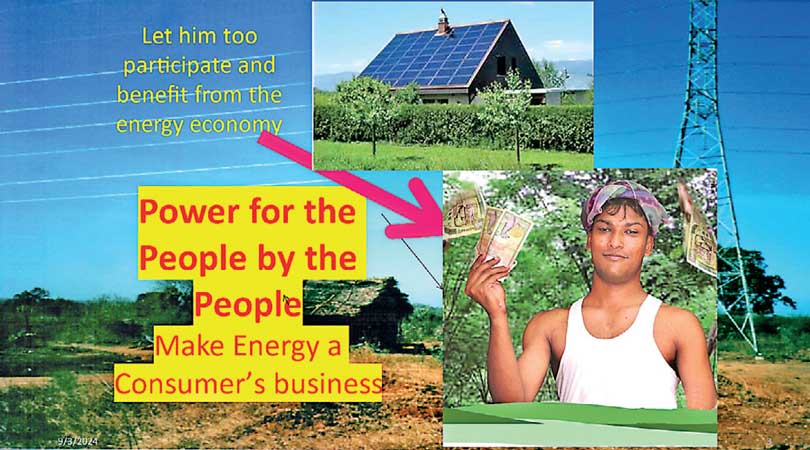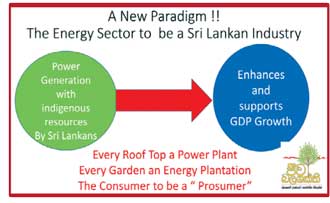Saturday Feb 07, 2026
Saturday Feb 07, 2026
Tuesday, 1 October 2024 00:05 - - {{hitsCtrl.values.hits}}

 There are many election manifestos flying around these days issued by the major contenders for the next Presidential election on 21 September 2024. This much awaited contest has a very significant focus on the national economy which is still in the grips of a dire emergency, irrespective of the claims of recovery made by those in power.
There are many election manifestos flying around these days issued by the major contenders for the next Presidential election on 21 September 2024. This much awaited contest has a very significant focus on the national economy which is still in the grips of a dire emergency, irrespective of the claims of recovery made by those in power.
While whatever possible local rupees are being mopped up by way of taxes and other levies, there does not seem to be much effort or plan to increase the inflow of forex which is essential if the impending major disaster in 2029, when the repayment of the loans have to commence, same estimated as $ 20 billion, is to be faced with any kind of confidence. If not the predictions of recurrence of the unimaginable hardships faced by the Sri Lankans in 2022 will be inevitable. The question is whether any of the contenders have offered a viable solution on how to gather these sentential catch of Dollars? The answer is a clear no, with all major parties just mouthing rhetoric and visions of increasing exports, which are just pipe dreams without a logical and viable strategy and action plan which are conspicuous by their absence.
In this regard it must be emphasised that it is much easier to save some of the forex being drained out of the country annually on imports, which can easily be replaced by local inputs, for which the capacity, feasibility and skills necessary are already available. Primary among these is the import of fossil fuels now at around $ 5,000 million annually and a significant number of food items as well as inputs needed for agriculture. The missing ingredient of course is the political will and cohesive and firm policies, which has escaped us so far.
The interest in renewable energy
It is interesting and encouraging to note that all manifestos published have highlighted the importance and need for the development of indigenous renewable energy sources to replace the imported fossil fuels. Even though most, if not all such refer mainly to the electricity supply ignoring the much greater problem of transport fuels which is near 100% imported and drain the majority of the $ 5,000 million. However, it is hoped that who comes to power, will have the perspicacity and the will to develop the necessary policies and strategies to tread this path and not fall back in to the usual practice of dumping the manifesto  in the dustbin, once elected. Such future policy needs to be carefully worked out and it is not too early for them to commence on this exercise. Some essential features that should govern such a future policy are enumerated below.
in the dustbin, once elected. Such future policy needs to be carefully worked out and it is not too early for them to commence on this exercise. Some essential features that should govern such a future policy are enumerated below.
Inalienable essential principles for a future energy policy
In addition the uniqueness of Sri Lanka, both in the variability of energy resources as the physical geographical nature of their distribution viz a viz the demand centres, should not be overlooked. Thus blind application of concepts and strategies used in the past or elsewhere is a road to disaster.
It is also inevitable that visionary and courageous development of this bonanza of nature of abundant indigenous renewable energy could be the means of achieving the much needed prosperity for all citizens of Sri Lanka.
This change is only possible by a paradigm shift in the way energy resources and supplies are viewed which accepts that:
nNational Security is closely linked to national Energy Security. This can be guaranteed only by ensuring that the energy industry remains in control of the national entities both public and private.
Energy and climate change
Sri Lanka need not pay any specific attention to contribute positively to the climate change efforts, if the logical change to renewable energy is adopted as national policy. We can easily meet the commitments already made under the NDCs (Nationally Determined Commitments) submitted to the UNFCCC, as a beneficial bonus of this change.
The logical policies and strategies for a sustainable future energy supply
While detailed themes, strategies and action plans follow, the desired change can emerge only from policies listed below, which embrace the earlier principles of people’s ownership of energy resources and the pathway for development has to be centred towards people’s development while ensuring access to the energy services and supplies at affordable prices as per Sustainable Development Goal No 7.
1. National Energy Policy to reach 80% Renewable Energy in the electricity sector by 2030 (this was the logical target later pruned by the CEB to 70%)
2. A firm national policy to ensure energy sector remains in control of Sri Lanka with necessary safeguards
3. To ensure reaching the target under the Suryabala Samgraamya to develop 1,000,000 units of roof top solar by 2030
4. Ministry directive to be issued to the CEB to develop a time targeted plan to reach 80% RE by 2030 with the mandate to achieve same, in collaboration with the private sector, who has already proven their capability and willingness to invest in this sector
5. Development of Energy Plantation via plantation sector companies to ensure energy and fertiliser supplies to plantation factories and enhancing the profitability of plantation companies by becoming fuelwood suppliers via Gliricidia and bamboo cultivation.
6. Set a challenging time based target to develop Dendro Energy reaching 1000 MW by 2030 out of the potential of over 2500 MW, which has the special attribute of immediate rejuvenation of the rural economy in addition to other spin off benefits
7. Implement the target of 20% light vehicle electrification by 2025 as proposed in the Gazette National Energy Policy dated Aug. 2019. (Ref 8 Section 4.5-5f, and Ref 1 Pg 57 )
8. Adopt a policy of 100% EV by 2035 for light vehicles in line with the world trend of stopping manufacture of diesel and petrol cars by 2055
9. Developing a vibrant local industry to convert existing 3W and Light cars to EVs, with financial support to the present users to convert. No further import of 3 W both petrol and electric.
10. Import only EVs to cater for the need to attract more passengers to public transport thus relieving the uncontrolled traffic congestion on roads
11. Develop the Green Hydrogen generation using the abundant RE resources as the means of monetising the massive RE resource for export without the undesirable linkage to the Indian grid, as the potential for reaching terms of energy exchange favourable to Sri Lanka are minimal.
12. While FDIs are welcome to the development of RE, the terms must be in the basis of already existing BOI regulations whereby they are confident of a fair return on investment. Under no circumstances should we pay Dollars for our own RE resources.
13. The misconception of the need for large scale RE power plants has to be overcome. All RE development is an agglomeration of a large number of small plants, which are viable in the small scale. This opens the means of distributed generation to match the distributed demand by generating as close as possible to the load centres avoiding the need for expensive transmission line development and the inevitable power losses in such long transmission lines.
14. Absolutely no unsolicited bids to be entertained for power generation for projects above 10 MW, as provided in the current electricity act No. 20 of 2009 with amendments and the new electricity act No. 36 of 2024. Only fair and competitive transparent bidding procedures to be adopted. The provisions for exceptions from this condition are clearly laid out and should not be allowed to be manipulated to accept unsolicited proposals
15. The close relationship and synergy between electricity and transport energy to be clearly understood and policies and strategies developed to leverage on this to ensure early achievement of the desired net zero goal, which is in the best interest of Sri Lanka
16. Recognise Sri Lanka’s best fortunate and circumstances to make a paradigm shift in the way energy is viewed at present, merely as an essential service to develop other sectors of the economy, to elevate it to a status of a vibrant and highly profitable industry on its own, with massive potential for earning foreign exchange and other many advantages.
17. Recognise that nuclear energy has no place or relevance for Sri Lankan energy system, primarily because it lies outside the already accepted principle of developing only generation systems of least economic cost on one hand and to gain non dependence on imported sources of energy.
18. Critically examine the viability of the yet pursued option of developing LNG power plants targeting imported LNG for which the essential infrastructure is not available nor are likely to be developed for many years at totally unknown cost, with the cost of generation of electricity impossible to be predicted.
19. Mandate the elimination of use of oil for power generation by not later than 2030, commencing now in stages by replacing the gap in generation by RE based electricity and mandatory DSM measures. This would result in a saving of Rs. 113 billion annually to the CEB based on current costs.
The details and background for the development of these policy initiatives are available in www.bioenergysrilanka.lk.
(The writer can be reached via: [email protected].)